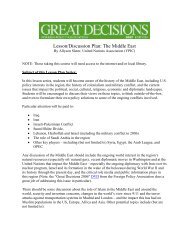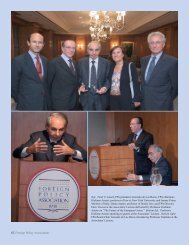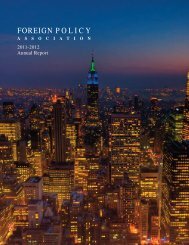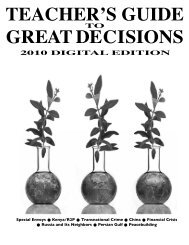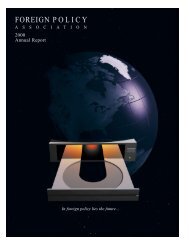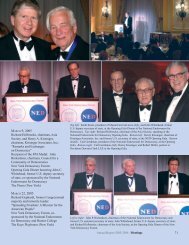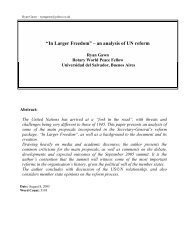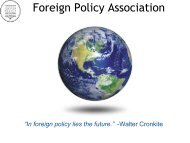Celebrating 90 Years - Foreign Policy Association
Celebrating 90 Years - Foreign Policy Association
Celebrating 90 Years - Foreign Policy Association
Create successful ePaper yourself
Turn your PDF publications into a flip-book with our unique Google optimized e-Paper software.
who arrived a few days after I did, the Coalition<br />
Provisional Authority did develop a plan. We<br />
started the transition to Iraqi-led governance, but<br />
we started too late. The murder of U.N. Representative<br />
Sergio de Mello was a big blow. We<br />
faced a violent insurgency, fueled from Syria and<br />
Iran, that gave us and the Iraqi people five painful<br />
years.<br />
We deployed overwhelming military force<br />
to overthrow Saddam. In retrospect, that was<br />
the easy bit. Afterward, we needed a plan and<br />
the resources, both civilian and military, to help<br />
a new and better stability emerge quickly. As<br />
the pottery store notice says, “If you break it, you<br />
own it.” Iraq was, and is, partly our responsibility<br />
until it can stand on its own feet again.<br />
I think the recent progress in Basra and<br />
Baghdad is welcome. Coalition efforts and a<br />
newly confident Iraqi government and army show<br />
that stabilizing Iraq is possible, even though it<br />
has been longer and more painful than any of us<br />
envisaged.<br />
I am telling you this because foreign policy<br />
happens in real life, in clashes of hard interests<br />
and ambitions, not in measured policy documents<br />
or angry op-ed articles. Secondly, I am<br />
telling you this because my experiences shape<br />
my approach at the United Nations. When I was<br />
in South Africa, we had no Internet. We communicated<br />
with family and friends by letter that took<br />
ten days to deliver. We could afford one brief<br />
phone call home per month. Victims of armed<br />
conflict found it even more difficult to communicate<br />
to the world.<br />
We deployed overwhelming mili-<br />
tary force to overthrow Saddam.<br />
In retrospect, that was the easy<br />
bit. Afterward, we needed a plan<br />
and the resources, both civilian<br />
and military, to help a new and<br />
better stability emerge quickly.<br />
If you break it, you own it.<br />
The situation is different now. Victims<br />
have a voice. Last summer I was in eastern<br />
Congo, driving along a mud track past shacks<br />
and stunning poverty. Yet every few hundred<br />
yards in Bukavu and Goma, there was someone<br />
selling cell phone cards. When the genocide<br />
took place in Rwanda in 1994, news took time<br />
to filter out. Today, we would be listening to<br />
telephone calls in real time from people screaming<br />
for help as killers approach their village. This<br />
change creates a new sense of global community<br />
and global responsibility. If you walk down the<br />
road in New York or Washington and see a brutal<br />
man flogging his child, you think it is right to<br />
intervene or at least to call the police. Is it really<br />
so different now at the international level?<br />
The moral case for intervention can quickly<br />
be lost if the intervention is not seen as legitimate.<br />
FOREIGN POLICY ASSOCIATION | 95<br />
MEETINGS: PRESENTATION BY SIR JOHN SAWERS




